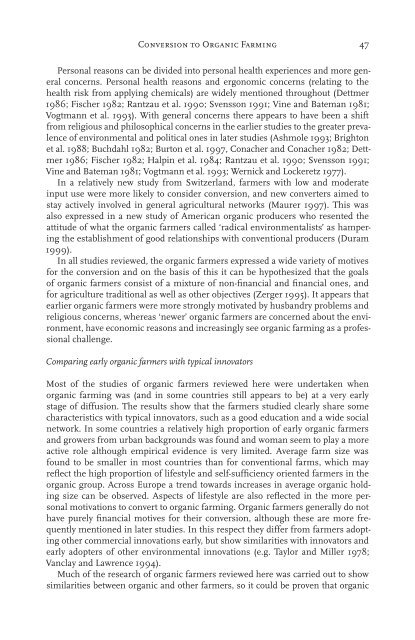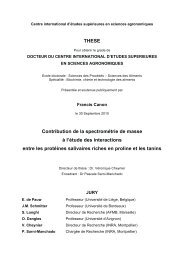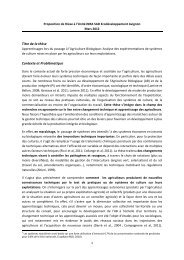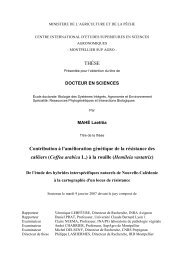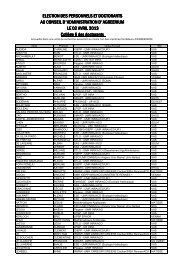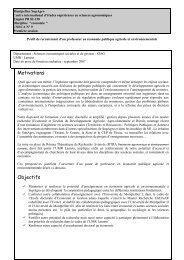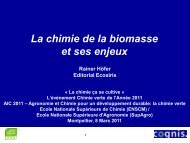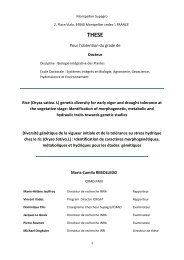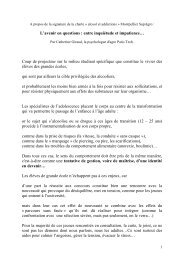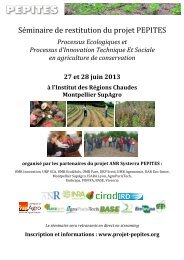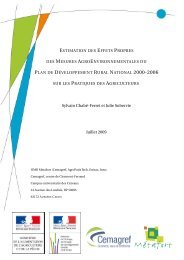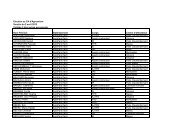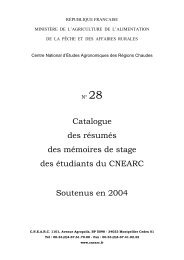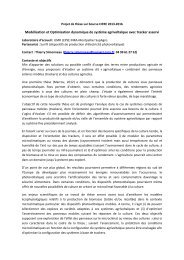<strong>Conversion</strong> <strong>to</strong> <strong>Organic</strong> <strong>Farming</strong>47Personal reasons can be divided in<strong>to</strong> personal health experiences and more generalconcerns. Personal health reasons and ergonomic concerns (relating <strong>to</strong> <strong>the</strong>health risk from applying chemicals) are widely mentioned throughout (Dettmer1986; Fischer 1982; Rantzau et al. 1990; Svensson 1991; Vine and Bateman 1981;Vogtmann et al. 1993). With general concerns <strong>the</strong>re appears <strong>to</strong> have been a shiftfrom religious and philosophical concerns in <strong>the</strong> earlier studies <strong>to</strong> <strong>the</strong> greater prevalence<strong>of</strong> environmental and political ones in later studies (Ashmole 1993; Brigh<strong>to</strong>net al. 1988; Buchdahl 1982; Bur<strong>to</strong>n et al. 1997, Conacher and Conacher 1982; Dettmer1986; Fischer 1982; Halpin et al. 1984; Rantzau et al. 1990; Svensson 1991;Vine and Bateman 1981; Vogtmann et al. 1993; Wernick and Lockeretz 1977).In a relatively new study from Switzerland, farmers with low and moderateinput use were more likely <strong>to</strong> consider conversion, and new converters aimed <strong>to</strong>stay actively involved in general agricultural networks (Maurer 1997). This wasalso expressed in a new study <strong>of</strong> American organic producers who resented <strong>the</strong>attitude <strong>of</strong> what <strong>the</strong> organic farmers called ‘radical environmentalists’ as hampering<strong>the</strong> establishment <strong>of</strong> good relationships with conventional producers (Duram1999).In all studies reviewed, <strong>the</strong> organic farmers expressed a wide variety <strong>of</strong> motivesfor <strong>the</strong> conversion and on <strong>the</strong> basis <strong>of</strong> this it can be hypo<strong>the</strong>sized that <strong>the</strong> goals<strong>of</strong> organic farmers consist <strong>of</strong> a mixture <strong>of</strong> non-financial and financial ones, andfor agriculture traditional as well as o<strong>the</strong>r objectives (Zerger 1995). It appears thatearlier organic farmers were more strongly motivated by husbandry problems andreligious concerns, whereas ‘newer’ organic farmers are concerned about <strong>the</strong> environment,have economic reasons and increasingly see organic farming as a pr<strong>of</strong>essionalchallenge.Comparing early organic farmers with typical innova<strong>to</strong>rsMost <strong>of</strong> <strong>the</strong> studies <strong>of</strong> organic farmers reviewed here were undertaken whenorganic farming was (and in some countries still appears <strong>to</strong> be) at a very earlystage <strong>of</strong> diffusion. The results show that <strong>the</strong> farmers studied clearly share somecharacteristics with typical innova<strong>to</strong>rs, such as a good education and a wide socialnetwork. In some countries a relatively high proportion <strong>of</strong> early organic farmersand growers from urban backgrounds was found and woman seem <strong>to</strong> play a moreactive role although empirical evidence is very limited. Average farm size wasfound <strong>to</strong> be smaller in most countries than for conventional farms, which mayreflect <strong>the</strong> high proportion <strong>of</strong> lifestyle and self-sufficiency oriented farmers in <strong>the</strong>organic group. Across Europe a trend <strong>to</strong>wards increases in average organic holdingsize can be observed. Aspects <strong>of</strong> lifestyle are also reflected in <strong>the</strong> more personalmotivations <strong>to</strong> convert <strong>to</strong> organic farming. <strong>Organic</strong> farmers generally do nothave purely financial motives for <strong>the</strong>ir conversion, although <strong>the</strong>se are more frequentlymentioned in later studies. In this respect <strong>the</strong>y differ from farmers adoptingo<strong>the</strong>r commercial innovations early, but show similarities with innova<strong>to</strong>rs andearly adopters <strong>of</strong> o<strong>the</strong>r environmental innovations (e.g. Taylor and Miller 1978;Vanclay and Lawrence 1994).Much <strong>of</strong> <strong>the</strong> research <strong>of</strong> organic farmers reviewed here was carried out <strong>to</strong> showsimilarities between organic and o<strong>the</strong>r farmers, so it could be proven that organic
48 Padelfarming had a wider relevance than just for a small group. However, it was frequentlyfound that <strong>the</strong> organic farmers studied were different from <strong>the</strong> averagefarmer. They were better educated, had less farming experience, had in some studiessmaller farms and placed less emphasis on pr<strong>of</strong>it maximization. The discussion<strong>of</strong> conversion studies in <strong>the</strong> adoption/diffusion framework throws an interestingnew light on <strong>the</strong>se results, as <strong>the</strong> difference can be interpreted as that between earlierand later adopters.The results <strong>of</strong> o<strong>the</strong>r surveys <strong>of</strong> organic farmers converting since <strong>the</strong> late 1980s,such as <strong>the</strong> better social integration <strong>of</strong> more recent adopters, an increasing averagefarm size and <strong>the</strong> increased importance <strong>of</strong> financial motivations, suggest that insome countries <strong>the</strong> stage <strong>of</strong> early adoption may have been reached. On <strong>the</strong> basis<strong>of</strong> <strong>the</strong> model it could be expected that <strong>the</strong> farmers adopting in this stage, <strong>the</strong> earlyadopters, would show again different personal characteristics. Fisher (1989) tried<strong>to</strong> establish a difference between earlier and later adopters <strong>of</strong> organic farming inNew Zealand, but did not succeed. Given <strong>the</strong> small numbers <strong>of</strong> organic farms inNew Zealand at <strong>the</strong> time <strong>of</strong> his study (a <strong>to</strong>tal <strong>of</strong> 200 certified farms (Crowder 1991))<strong>the</strong> lack <strong>of</strong> success is not surprising.A Norwegian sociological study found three different categories <strong>of</strong> organic farmersin Norway, labeled as: Anthroposophists, Ecosophists, and Reformists. The Anthroposophistswere influenced by biodynamic agriculture and Rudolf Steiner andshowed some similarities <strong>to</strong> <strong>the</strong> innova<strong>to</strong>rs <strong>of</strong> <strong>the</strong> adoption model, such as a verystrong commitment <strong>to</strong> <strong>the</strong>ir ideas. Farmers in <strong>the</strong> second cluster <strong>of</strong> Ecosophistswere motivated by green ideas. They were part <strong>of</strong> <strong>the</strong> environmental and back <strong>to</strong><strong>the</strong> land movement and Vartdal (1993) argued that <strong>the</strong>y showed some similarities<strong>to</strong> early adopters. In both categories a non-farming background was widespread.The Reformists were described as ‘normal’ farmers with a pragmatic approach <strong>to</strong>organic agriculture and were described as corresponding <strong>to</strong> <strong>the</strong> early majority in<strong>the</strong> adoption model (Vartdal 1993). This confirms <strong>the</strong> applicability <strong>of</strong> <strong>the</strong> model,although some <strong>of</strong> Vartdal’s results seem <strong>to</strong> suggest that Reformists might represent<strong>the</strong> early adopters category <strong>of</strong> agricultural opinion leaders, whereas <strong>the</strong> two o<strong>the</strong>rgroups would fall in<strong>to</strong> <strong>the</strong> category <strong>of</strong> innova<strong>to</strong>rs.This difference between <strong>the</strong> ‘early idealists’ and <strong>the</strong> later ‘pr<strong>of</strong>it oriented pragmatists’is heatedly debated in <strong>the</strong> organic movement in various countries. This conflictis also reflected in some studies <strong>of</strong> <strong>the</strong> organic farming movement. Vartdal(1993), for example, <strong>to</strong>ok <strong>the</strong> perspective <strong>of</strong> an interested conventional farmer,seeing <strong>the</strong> early organic farmers and <strong>the</strong>ir organizations as gatekeepers, who protected‘<strong>the</strong>ir’ innovation and <strong>the</strong>refore made it more difficult for conventional farmers<strong>to</strong> adopt. Gerber et al. (1996), on <strong>the</strong> o<strong>the</strong>r hand, positioned <strong>the</strong>mselves as par<strong>to</strong>f <strong>the</strong> ‘old’ organic movement in Germany and discussed any pressure <strong>to</strong> reduce<strong>the</strong> requirements in <strong>the</strong> standards as coming from <strong>the</strong> outside and claimed that <strong>the</strong>true organic movement had <strong>to</strong> protect its identity. Allowing a greater number <strong>of</strong>farmers <strong>to</strong> participate was seen as a threat <strong>to</strong> <strong>the</strong> principles. Tovey (1997) discusseda similar process in <strong>the</strong> Irish organic movement, which according <strong>to</strong> her consisted<strong>of</strong> many members that were not food producers. Again she emphasized <strong>the</strong> dangerthat with an increasing number <strong>of</strong> farmers and <strong>the</strong> need for larger organizations,such as <strong>the</strong> establishment <strong>of</strong> certification procedures, <strong>the</strong> organic movement maybe in danger <strong>of</strong> loosing its identity.


